The findings of an investigation into the M9 crash which killed two people will make for “some brutal reading” for Police Scotland, the organisation which represents the force has predicted.
Lamara Bell, 25, and John Yuill, 28, died after lying in a crashed car for three days after it was first reported to the police.
Ms Bell was critically injured in the July crash off the M9 near Stirling while her partner, John Yuill, 28, died at the scene.
The case is subject to an independent probe by the Police Investigations and Review Commissioner (Pirc).
Calum Steele, general secretary of the Scottish Police Federation (SPF), which represents officers below superintendent rank, said the incident – which sparked heavy criticism – had “really hurt” Police Scotland.
Speaking at an SPF fringe event at Scottish Labour’s conference in Perth, he said: “We know that the issues surrounding the M9 in particular have led to a real intake of breath across Scotland, and indeed it is such a significant failure that it has really hurt the service.
“I suspect that when the report for that is published in the very near future, that is going to make for some brutal reading for the service.
“But I also believe that there will undoubtedly be a significant element of finance identified as being a particular factor in that.”
Following the M9 crash, the Scottish Government also ordered Her Majesty’s Inspectorate of Constabulary in Scotland (HMICS) to undertake an urgent review of all police call handling, with the findings expected to be published imminently.
Opposition parties have suggested that the tragedy is a consequence of cuts to call centres and the civilian workers who staff them.
Police Scotland has been tasked with making £1.1 billion of savings by 2026.
Niven Rennie, president of the Association of Scottish Police Superintendents (ASPS) told the fringe event: “It remains extremely difficult to keep police services at their current level while the budget is being slashed.
“The Government’s policy of 1,000 extra officers introduced in 2007 severely restricts our ability to make the necessary savings.
“I am not advocating the removal of extra officers from policing.
“I don’t know how many officers we need for policing… What I am arguing is that it is worthless to have 17,234 officers if we remove all the other facilities that are required by modern police services, and utilise these officers to do civilian duties.”
He called for a “mature” debate on policing.
“This won’t happen whilst it is used as political football, with parties on each side taking cheap political shots at each other,” he added.
“Policing today requires a much more complex dialogue. It requires the Scottish Government to stop saying ‘we’ve given you 1,000 extra officers and there is a 40-year crime low’, and it requires the opposition to stop using every error as a stick to beat the Government.”
